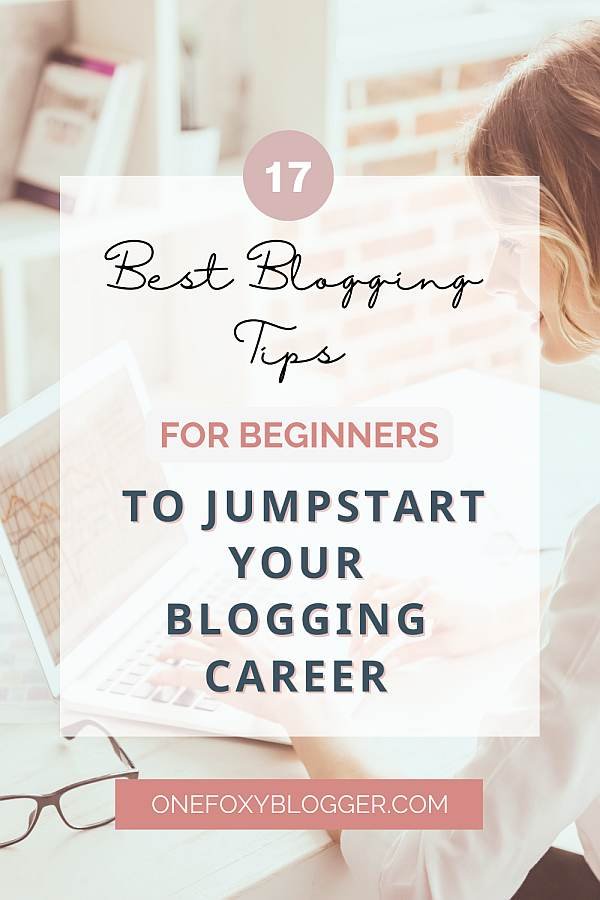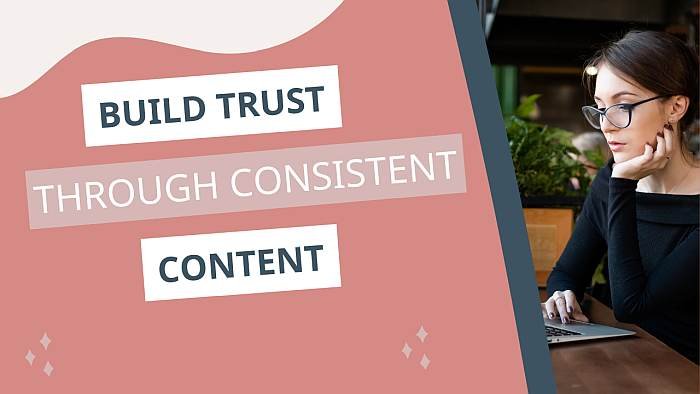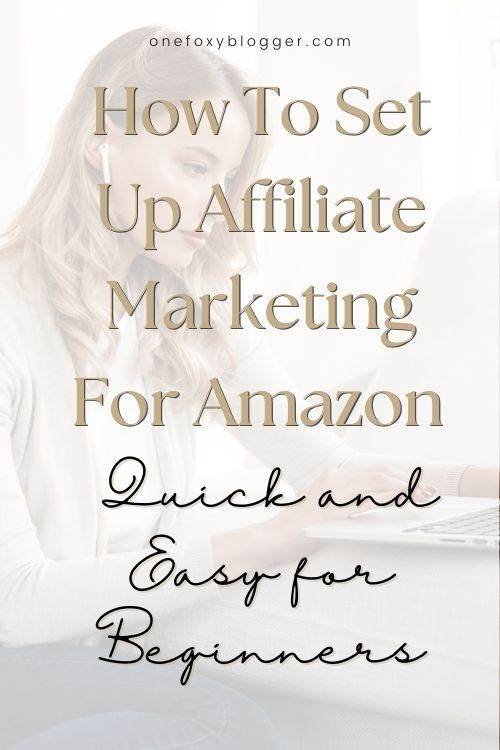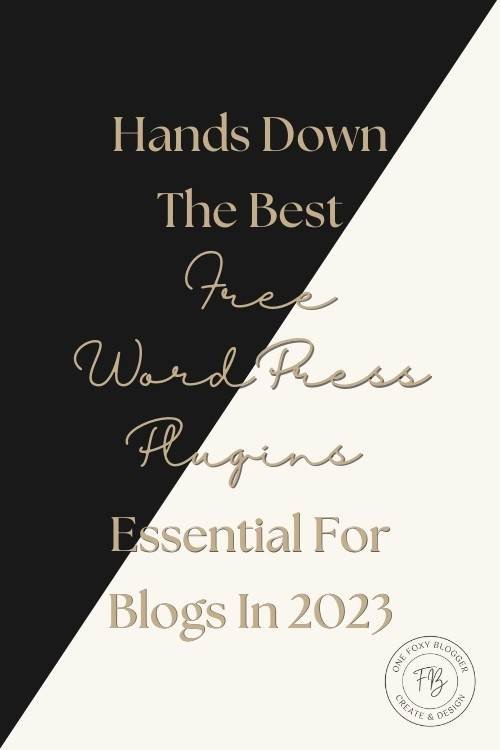17 Best Blogging Tips for Beginners to Jumpstart Your Blogging Career
You’re thinking about starting a blog but find the amount of information available overwhelming. The idea of creating a blog from scratch can be intimidating, but don’t worry – this blog is all about helping you with that!
This post may contain affiliate links. This means I get a commission if you purchase through my links at no cost to you. Read the full disclosure here.

In this post, we’ll share 17 essential blogging tips for beginners like you who want to jumpstart their blogging journey. From choosing a niche to promoting your blog and engaging with your audience, these tips will help you create a successful blog that will be noticed.
If you want to improve your blogging game, here are some helpful beginner blogging tips.
So, if you’re ready, let’s start.
1. Choose the perfect niche – Passion vs. profitability
First on our list of blogging tips for beginners is about choosing a niche. This is one of your most important decisions when starting a blog. Having a niche for your blog is essential because it attracts and retains readers.
When choosing a niche, it’s important to consider your interests, expertise, and potential for growth. You want to choose a niche that you’re enthusiastic about and can provide consistent content for. But also has the potential to attract a large audience.
Remember, your niche should be specific enough to distinguish your blog from others but broad enough to allow for various content topics. Choosing the right niche for your blog puts you on the path to success and ensures you’re unique in a crowded blogging world.
Read more: Best tips for choosing a niche: Unlock 150 profitable niche ideas.
2. Identifying your purpose: why do you want to start a blog?
Setting goals is crucial for any blogger who wants to succeed. In goal setting, “SMART” stands for Specific, Measurable, Achievable, Relevant, and Time-bound. If you want to ensure your blog goals are realistic and attainable, keep these five factors in mind.
Rather than setting a goal like “I want to increase website traffic,” a more specific one could be “double my website traffic in the next six months.” With smaller, more manageable goals, you’re more likely to succeed. Whatever your goals, make sure they are attainable and have a deadline.
Get started setting your goals by downloading a free blog goal planner. This planner is available in our Freebie Library.
3. Make sure to optimize your title and domain name for SEO
Titles and names are important when you create a blog. In addition to making your blog easier to find, they can make it easier for search engines to understand how your blog works.
These two tips will help you make your blog’s title and name SEO-friendly:
- Find out what people search for and use those keywords. Having a clear topic for your blog will give search engines an idea of what it’s about, resulting in a higher ranking. If you are blogging about buying and selling cars, you might use the word “cars” in the blog title or name.
- Be sure to use an original name. It’s important not to get confused with another blog or company. Look online for similar terms before naming your blog. If that’s the case, choose something different.
To come up with a name for your blog, you can use a tool called a “domain name generator.” You can use it to brainstorm and check availability.
You may also like: Discover The 9 Best SEO Tools For Finding Winning Keywords.
4. Essential steps for producing high-quality content
For your blog to succeed, you will need to write quality content. Make your blog posts engaging, informative, and well-written so your readers return.
You must research every topic exhaustively to provide valuable content to your readers. Use conversational language and write in a way that a twelve-year-old can understand.

Your content needs to be visually appealing. Mixed media posts do better than word-only posts on blogs. Consider breaking up your blog posts by including images, videos, and infographics. Or you can embed podcasts once you’ve mastered writing engaging blog posts.
Finally, by writing quality content, you establish yourself as an expert and will soon have a loyal fan base.
5. Create categories for your blog
You should organize your blog similarly to how you would organize your closet. It’s frustrating if you are looking for something but cannot find it because of the chaos. Blog organization is the same. When you set up your blog, try to format your blog so readers can easily navigate.
Google loves a proper site structure, so its algorithms consider website structure when ranking top posts. This means that if you have neatly organized blog categories, it benefits your blog in every way. You can, for example, add your main category topics to the navigation menu.
an easy-to-navigate site structure on your blog.
6. Promoting your blog is essential for growth
Many blogging tips for beginners are available online, but promoting your blog is one you should pay attention to. Blog promotion is crucial to growing your readership and building a community around your content. You can promote your blog in several ways, including social media, guest posting, and email marketing.
Using social media platforms like Pinterest, Facebook, and Instagram to promote your blog is a great way to engage with readers. You can also establish yourself as an expert by guest posting on other blogs within your niche.
The biggest mistake you can make when starting a blog is not building an email list. While email marketing may be somewhat of a challenge at first, you can actually make a great deal of money with it.
Additionally, for many experienced bloggers, email marketing is the number one tool for promoting their blogs. Remember to include social media share buttons and email subscription options on your blog so readers can share and stay in touch. Your blog will get new readers and build a loyal community if you promote it well.
7. Audience engagement is crucial to blogging success
Growing your blog is all about engaging your audience. Building a community around your blog will make readers regular visitors. You can interact with your audience in several ways, such as responding to comments, asking for feedback, and hosting giveaways or contests.

Engaging with your readers by answering their comments and questions shows that you value their input. Asking for feedback on your blog content can also help you improve and better serve your audience.
Remember, the more you engage with your audience, the more likely they will share your content and recommend your blog to others. Implementing simple blogging tips for beginners like these is a great way to improve your blog.
8. Choosing the right keywords for your blog
If you optimize your blog for search engines (SEO), you’ll get more traffic and readers. Your content must be keyword-rich, and you’ll want to optimize your titles and meta descriptions. I recommend you install an SEO plugin like Yoast or Rankmath to help you optimize your pages.
Including internal and external links is equally important to optimizing your blog for SEO. Your keywords should be relevant to your content and used naturally throughout your post.
Moreover, including several internal and external links will help your Search engine rankings and also make your content more informative and valuable to readers.
While SEO is important, you should also focus on creating quality, helpful content for your readers. Try to balance between SEO and quality content; this will help your blog succeed in the long run.
9. Focus on creating evergreen content
I am sure you have heard of the term Evergreen content. “Evergreen” content is content that remains relevant long after it was published, so it attracts more traffic over time.
Trendy and current topics may seem perfect for blog posts, but remember that they will soon become dated. Therefore, you should concentrate on writing evergreen content. Consider evergreen formats like lists, tips, product reviews, tutorials, and how-to videos to generate lasting content.
Video works incredibly well when you want to show someone how to do something, like creating Canva templates or starting an Etsy shop. If you have no experience producing videos, you can alternatively present your information through images (photos, illustrations, charts, etc.).
For example, these articles would qualify as evergreen.
- How to Plan a Budget and Make It Work
- How to Paint Your Bedroom Like a Pro
- How to Organize Your Closet in 15 Minutes or Less
10. Give your audience useful information
To write a good blog post, you must give your readers the information they can use and benefit from. You can, for example, tell them what steps they can take to achieve their goal or put new ideas into practice.
People searching online for information want something that will help them out.
Actionable steps are essential to stand out in Google search results, so include them in your blog post. How-to guides and tutorials are the easiest types of blog posts to create. It is easy because you are talking about something you already know, which can be your product or service. Another type of blog post that is popular with readers is a listicle.
Using lists properly can be great for compiling tips, advice, or ideas about a particular topic, helping you produce awesome content.
You can download 9 Free Blog Post Templates from Wordstream.com to get started.
By writing these types of blog posts, your readers will feel they’ve learned something useful and valuable from your content.
11. Use analytics to identify your most popular content
Why track your blog’s performance? Well this way, you can identify which content performs well and which areas need improvement. You can also track and adjust your marketing campaigns to make them more successful.
Google Analytics and WordPress Stats are popular analytics tools that give you valuable data about your blog.
For my blogs, I use a plugin named Clicky Analytics. It’s a plugin that shows you detailed data about online users, the number of visits, actions taken, bounce rates, organic searches, and average time spent on your site. Analyzing your blog can help you make informed decisions and continuously improve it.
12. Build relationships with fellow bloggers.
It’s great to network with other bloggers in your niche and learn things from each other. Make connections with other bloggers and team up on projects like guest posting and hosting webinars. You can also gain valuable insight into blogging best practices from their experiences.
You can participate in online communities, attend conferences, and use social media platforms. They are all ways to network. Be authentic and genuine in your networking interactions, and offer value to others instead of just asking for things.
Building a blog network can help you reach a wider audience and get your blog noticed.
13. Build trust with your readers through consistent content

Don’t write whenever you feel like it. Make a writing schedule. Stay consistent.
When you’re a new blogger, you have a decision: How often will you post? Once a week or a month?
Don’t make your audience wait too long for new content. But it’s also unnecessary to publish a new post daily. The truth is, you’ll grow quicker if you write more often. You shouldn’t let the number of your posts affect their quality, though.
Set a regular posting schedule and stick to it. It’s a must to keep readers happy by being consistent.
14. Use editing tools to make each post perfect
Editing blog posts requires dedication if you want your post to be perfect. When I started my first blog, I often spent hours editing my work until it was what I hoped to be, of the highest standard. Despite my best efforts, I still made mistakes, which was frustrating and disheartening. Yet, I realized that having a step-by-step editing system is necessary. That is if you want to get some work done.
You can use Microsoft Word or Google Docs to write your posts. Or you may prefer to write their content directly in WordPress.
I prefer to write and edit my blog posts in a Word document and edit with Grammarly (Pro version). I do not write my posts in Grammarly. The constant writing suggestions are too distracting. I need to work in an environment with no distractions to give attention to every aspect of the text. After finishing a post in Word, I copy it to Grammarly to start the editing process.
I also recommend you use Hemmingway. The Hemingway editor is much like Grammarly, a free writing and editing tool that helps you write better.
If you edit while writing, you’ll be less productive, which may affect the post’s quality.
And be reasonable with the editing. Don’t over-edit your blog posts; you’ll need two months to finish one! Take the time to follow these editing steps as best you can, then publish it.
15. How to stay motivated and passionate about your blog?
Writing a blog can take a lot of time and effort, and I know it can be hard sometimes. But if you really care about your blog and love writing great content, don’t stop! Many beginning bloggers tend to give up when things get tough.
Believe it or not, readers can tell how much you care about your blog by how you write. Think about why you started your blog in the first place and focus on your passion.
Let’s be real. If this is your first blog, it’s likely you won’t be able to earn a full-time income immediately. Sometimes, it takes a while before you start making money. The odds stack in your favor if you keep working hard.
If you’re ever tired or not motivated to write, it’s time to take a break, refresh your mind, and return to it when you feel better. Keep yourself motivated by thinking about how your content improves people’s lives.
To succeed long-term, you’ve got to love what you do. It has to be fun for you to read and write about it, not just to make money.
16. Learn how to monetize your blog
There are many opportunities for you to make money blogging. Understanding the different ways in which you can monetize your blog will not harm your goal. It might even motivate you to work harder.
If you are just starting out, figuring out how to monetize your blog can seem a bit daunting. It’s clear that there’s no set of rules for monetizing a blog, but bloggers can choose from a variety of methods.
Check out our post: Make money blogging – 11 ways for monetizing your passion.
17. Every blog post needs a Call to Action
You believe you write the most fascinating blog posts with all the right keywords, perfect grammar, and stunning imagery in place. Still, something is missing. No matter how interesting your blog posts are, your readers leave without engaging or taking any action.
One of the most important blogging tips for beginners is the following. Let me tell you, the secret ingredient to making your blog posts irresistible is a call to action (CTA).
A CTA is like a coach that tells your readers what to do next. That may be a short sentence that encourages your audience to take action. Whether it’s buying a product, signing up for a newsletter, or sharing your content on social media.
But why do blog posts need a CTA?
Because without a CTA, your blog post is like a delicious cake without frosting. Sure, it tastes good, but it’s missing something that makes people want to return for more. A CTA gives your blog post a purpose and helps you achieve your marketing goals.
Read also: 50 Call To Action Phrases That Are Sure To Convert
Frequently Asked Questions
What are some tips for writing quality content?
Writing quality content is easier when you know your niche and understand your audience. Make sure you research your blog topic and your target audience before you begin writing. You should always be honest when you are writing. Many articles online can help you improve your writing skills. Writing high-quality content is the first step toward creating a successful blog.
How do I blog with no experience?
It doesn’t matter if you’ve never had any experience building a blog or website. Starting one has never been easier. I created this blog to help you start a blog (super easy), providing blogging advice for new bloggers. If you want to start a blog right now, my post starting a blog with WordPress explains everything step-by-step.
More blogging tips and tricks for beginners on the page: The best resources for bloggers
All things considered
Blogging can be exciting and rewarding, but it can be overwhelming for a beginner. By following these effective blogging tips for beginners, you can jumpstart your blogging career and set yourself up for success.
With dedication and hard work, your blog has the potential to grow and thrive. So, go out there and start creating content that you are passionate about, and don’t forget to have fun along the way. Ready to jumpstart your blogging journey? Start implementing the 10 essential tips from this post today and see your blog thrive!
Did I miss any blogging tips? Let me know in the comments!
I’ve put together a blog post checklist to make your life easier. Make sure to sign up for my newsletter to access my freebie library and for more helpful blogging tips for beginners!


![Master the art of creating an ebook to sell online [read or miss out] 7 Master the art of creating an ebook to sell online [read or miss out]](https://onefoxyblogger.com/wp-content/uploads/2022/03/creating-an-ebook.jpg)


